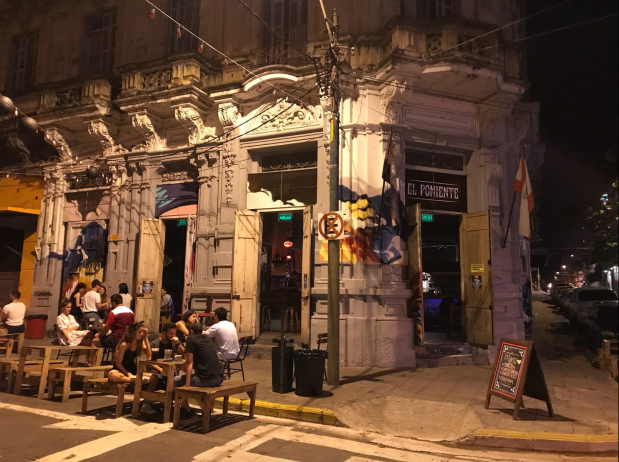Summer in downtown Asuncion feels like the climate apocalypse. Masonry crumbles from neglected facades of 19th-century buildings. Tires puncture in potholes gouged by ferocious heat and tropical rain.
El Poniente, a bar on the ground floor of a Baroque townhouse with murals on both sides of its saloon-style doors, is a suitably anarchic presence amid this long-lost grandeur. Inside, a selection of scotch, whiskey, and bourbon is chalked on a blackboard above a ramshackle bar. A few regulars perch on stools, looking out over a concrete dance floor which, as the night progresses, crowds with grooving bodies. The music is unpredictable; a single evening’s playlist encompasses cumbia, trance, trap, and a Black Keys tribute band.
El Poniente bills itself as a “whisky bar.” While there’s certainly more scotch here than in most Latin American drinking establishments, it’s not unusual to come across Glenfiddich or Dalmore when bar-crawling in Asuncion. For a traveler with northern blood, this is an unexpected pleasure—though, like bathtubs and barbed wire, scotch in Paraguay carries its own dark symbolism.
For 35 years, from 1954 to 1989, Paraguayans suffered under the dictatorship of Alfredo Stroessner. Remembered for his brutal suppression of political opponents and preference for young girls, Stroessner appeased the country’s military establishment with rewards from its vast, state-run smuggling operation. For a few years in the middle of his murderous reign, Paraguay had the highest per capita whiskey consumption in the world. A bottle of single malt was the official stamp of approval on every general’s desk. The remainder was smuggled across the border into Brazil, a trail followed today by ton after ton of marijuana.
On weekend nights, the street fills with people passing joints and sharing cans of store-bought Pilsen, the national lager.
So what sets El Poniente apart isn’t Glengoyne available at $4 a generous pour, but how the party spills beyond the rickety outdoor tables and onto the pavement opposite. On weekend nights, the street fills with people sharing cans of store-bought Pilsen, the national lager. This informal arrangement makes El Poniente a haven for less affluent Asuncenos and shoestring travelers alike.
Police show little interest in these spontaneous street fiestas. Such lax attitudes are evident throughout downtown Asuncion: Prostitutes gather on the same street corners each night, and teenagers in central plazas toke on the continent’s cheapest grass. To the fresh arrival, the absence of law enforcement may be a mystery—but it’s one with a simple explanation.
In Paraguay, now a somewhat shaky democracy, the law is brazen in prioritizing elite interests. Conflict over land, the country’s main source of wealth, drives the rural poor off their small holdings and into the cities. In Asuncion, many end up living in los banados, a maze of rickety wooden structures built on the banks of the River Paraguay. Los banados act as a lodestone for the city cops, who park up around the district’s outskirts, ensuring the petty crime generated by desperate poverty doesn’t overflow into the rest of the city.
As a result, while only the city’s wealthier residents can afford a single malt in El Poniente, everyone else is free to congregate on the stoops, benches, and curbs outside. Budget travelers can stroll down Calle Palma, pick up a Pilsen and a pack of Kentucky cigarettes, and join the locals smoking by the bar’s doors. Those with a few bucks to spare can head inside, grab a shot of Jameson, and hit the dance floor. Both approaches are fine ways to slide into the city’s supremely laid-back culture.
